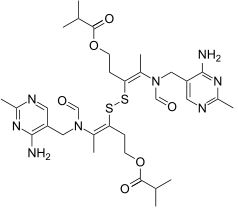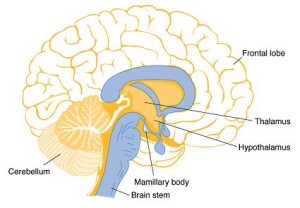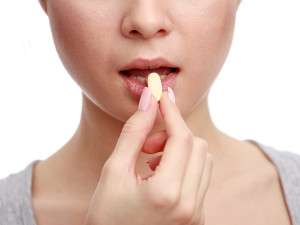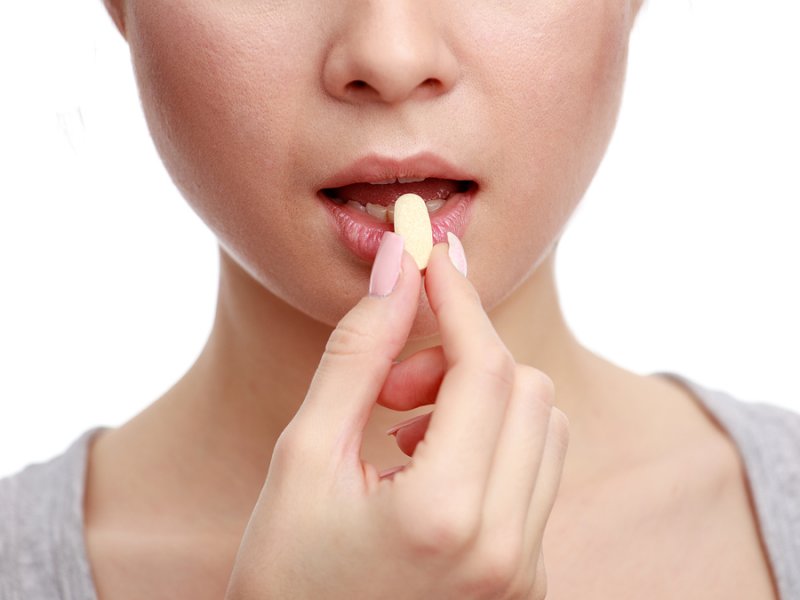Table of Contents
Sulbutiamine (isobutyryl thiamine disulfide) is a synthetic derivative of Vitamin B1 (thiamine). Thiamine was the first B Vitamin to be discovered by researchers. That’s why it’s called B1.
Sulbutiamine is simply two vitamin B1 molecules joined together. This chemical bond helps thiamine more easily cross the blood-brain barrier.
Japanese scientists first synthesized Sulbutiamine in an attempt to quell a health crisis within the Japanese population. After WWII, the Japanese diet largely consisted of rice. This left them deficient in several key nutrients including thiamine.
Insufficient thiamine led to a central nervous system disorder called Beriberi. But supplementing with thiamine alone didn’t help. Because of its poor bioavailability. And a lot of thiamine was needed to cure Beriberi symptoms.
Sulbutiamine is far more bioavailable than standard thiamine. It is fat-soluble (thiamine is water-soluble) which helps it more easily cross the blood-brain barrier.
The discovery of Sulbutiamine cured the Japanese population of a life-threatening disease. And it has since been tested and used throughout the world with much success.
Throughout this article I’ll refer to Sulbutiamine interchangeably with thiamine. Sulbutiamine is the stronger of the two so it’s affects are amplified compared to standard thiamine.
Thiamine is a coenzyme used by your body to metabolize food for energy. And to maintain proper heart, nerve and brain function.
Thiamine also helps digest and extract energy from food. It turns nutrients into adenosine triphosphate (ATP). ATP is the fuel created by your cell’s mitochondria.
And thiamine helps convert carbohydrates into glucose. The energy your body uses for your brain and nervous system.
One more thing about this miracle B-vitamin. Thiamine contributes to the development of myelin sheaths which wrap around axons to protect them from damage.
Sulbutiamine helps:
- Brain Optimization: Thiamine is critical for increasing focus, energy, and preventing memory loss. And can ward off inflammation. Healthy brain function is crucial for good decision making.
- Neurotransmitters: Thiamine is essential for producing the neurotransmitter acetylcholine (ACh). ACh is used to relay messages between neurons in your brain. And is critical for cognition, learning and memory.
- Mood: Thiamine helps your body withstand stress. A lack of energy can contribute to poor mood and motivation. Thiamine can boost your mood, and defend against depression and anxiety.
What is Sulbutiamine? (thiamine derivatives)
Sulbutiamine is a synthetic version of Vitamin B1 (Thiamine). Japanese researchers synthesized Sulbutiamine by bonding two B1 molecules.

They developed Sulbutiamine in response to a country-wide health crisis. The Japanese population were severely thiamine-deficient from a rice-only diet. Large numbers of the population were suffering from Beriberi. A central nervous system disorder caused by a lack of thiamine.
Your body does not produce thiamine on its own. So you must get it from food including beef, brewer’s yeast, legumes (beans, lentils), milk, nuts, oats, oranges, pork, rice, seeds, wheat, whole-grain cereals, and yeast.
But thiamine has poor bioavailability. By synthesizing thiamine and producing Sulbutiamine you end up with a fat-soluble compound that is easily digested. And readily crosses the blood-brain barrier.
Sulbutiamine vs. Thiamine: What’s the Difference?
Sulbutiamine is a synthetic version of Vitamin B1 (Thiamine). It is two B1 molecules chemically bonded together.
Thiamine is water-soluble and does not easily cross the blood-brain barrier. Sulbutiamine is a fat-soluble compound that easily crosses the blood-brain barrier.
Sulbutiamine functions in the body just like thiamine. But because it’s more bioavailable it’s more effective than thiamine.
How does Sulbutiamine Work in the Brain?
Sulbutiamine boosts brain health and function in several ways. But two in particular stand out.
- Sulbutiamine is a fat-soluble molecule that crosses the blood-brain barrier more readily than thiamine. Once in your brain, it increases levels of thiamine pyrophosphate (TPP).
Thiamine pyrophosphate (TPP) is directly involved in the citric acid cycle in the brain.
This cycle breaks fatty acids, amino acids and monosaccharides into smaller molecules that produce adenosine triphosphate (ATP) energy within your mitochondria. And provide the building blocks of the molecules needed to produce brain cells.

A deficiency of TPP can eventually show up as Wernicke encephalopathy and Korsakoff syndrome. In our society this syndrome is typically caused by chronic alcoholism. But it can also occur after obesity (bariatric) surgery, Crohn’s disease, anorexia and if you’re on kidney dialysis.
Symptoms of Wernicke-Korsakoff syndrome include confusion, inability to form memories, loss of memories and muscle coordination, confabulation (making up stories) and vision changes. And can ultimately (and very rapidly) lead to coma and death.[i]
Less severe cases of thiamine deficiency include fatigue, weight loss, irritability and confusion.
- Sulbutiamine also contributes to the production of the enzyme PDH which is essential in making the neurotransmitter acetylcholine. And for the synthesis of myelin, which forms a sheath around the axons attached to neurons. Ensuring these neurons can conduct signals.[ii]
The citric acid cycle and enzyme α–KGDH play a role in maintaining optimal levels of the neurotransmitters glutamate, and gamma–aminobutyric acid (GABA).
When thiamine levels decrease, the activity of these enzymes are reduced.[iii]
How things go bad
We depend on our diet for thiamine. Very little thiamine is stored in your body. And depletion can occur within 14 days.
Thiamine deficiency can be caused by alcoholism, Alzheimer’s Disease, anemia, athletes who reduce food intake, cancer, clogged arteries, Crohn’s disease, diabetes, diarrhea and kidney disease. And even a poor diet.
↓ Low thiamine levels can slow creation of ATP
↓ Low thiamine levels can cause problems with memory, learning, recall and perception
↓ Acetylcholine levels decline
All of these changes can happen at any age. And are a product of the food we eat, what we drink, lifestyle habits, the air we breathe and more.
So Sulbutiamine can help age-related cognitive decline, as well as a student looking to do better in school. By boosting acetylcholine, dopamine and GABA in the brain. And increased brain energy by creating ATP within mitochondria. And building myelin sheaths that protect our axons.
Sulbutiamine benefits
Sulbutiamine is directly involved in the citric acid cycle that provides adenosine triphosphate (ATP) energy created within your mitochondria.
Sulbutiamine also plays a role in maintaining optimal levels of the neurotransmitters glutamate, and gamma–aminobutyric acid (GABA). And contributes to the production of the enzyme PDH which is essential in making the neurotransmitter acetylcholine.
Sulbutiamine will boost cognition, memory and decision-making. And has very effective anxiolytic (anti-depressant) qualities.
How does Sulbutiamine feel?
Sulbutiamine is a fat-soluble form of thiamine which crosses the blood-brain barrier. It has been shown to improve glutamatergic, cholinergic, and dopaminergic neurological transmissions. It may also increase the density of D1 dopamine receptors.[iv]
Nootropics users report:
- Sulbutiamine as a study aid. On its own, Sulbutiamine seems to increase attention span for many neurohackers. And when combined with caffeine or any one of the racetams, many report being able to work effortlessly for hours on end. Study and work seems less stressful.
- Boost motivation. Sulbutiamine boosts motivation and many report gives them the drive they need for study or work.
- Increased focus. Sulbutiamine helps provide laser-like focus at work and school. Some report even with the most tedious of tasks. While staying in a very good mood.
- Sociability. Many users report being able to articulate thoughts, and improved speaking ability. Language and your vocabulary seem to flow effortlessly. Thoughts and ideas come with less effort.
- Improved mood. Personally, I’ve found Sulbutiamine to be more effective than any prescription antidepressant I’ve ever tried. And without the side effects.
You should be able to experience the effects of Sulbutiamine soon after you take it.
Sulbutiamine Clinical Research (thiamine deficiency)
Sulbutiamine Improves Mood
A study at the University of Wales Swansea in the UK worked with 120 young adult females. Study participants took either a placebo or 50 mg thiamine for 2 months. Mood, memory and reaction times were monitored before and after taking the tablets.
The results indicate that after 2 months of thiamine supplementation, the young females:
- Were more clear headed
- Felt more composed and energetic
- Reaction times improved
- Improved mood.[v]
Sulbutiamine for Chronic Fatigue
If you deal with chronic fatigue, Sulbutiamine may be a better option than another cup of coffee. Or a stimulant.
Researchers at the Hospital Saint-Antoine in Paris studied 326 patients. All suffering from chronic fatigue. Patients were given 400 mg or 600 mg of Sulbutiamine daily. Or a placebo in this double-blind, parallel-group study.
Patients were tested on the 7th and 28th days of the trial. Those that used 600 mg of Sulbutiamine had less fatigue.[vi]
Sulbutiamine Improves Memory
Poor memory is associated with low levels of choline activity in the brain. Choline is a precursor to the neurotransmitter acetylcholine (ACh). ACh transmission between neurons helps in memory formation.
Scientists decided to find out if Sulbutiamine could help boost choline uptake. They gave a group of mice Sulbutiamine for 10 days, and then tested their memory. The findings suggested Sulbutiamine improved memory formation. And it was due to an increase in choline activity in the brain.[vii]
Another study in France involved giving Sulbutiamine or a saline solution to rats for 9 weeks. The results of this study concluded Sulbutiamine provided better working and episodic memory.[viii]
Sulbutiamine Improves Athletic Performance
Many neurohackers use Sulbutiamine for a boost in physical energy. And it’s created some controversy in professional sports.
The Moscow Anti-Doping Center analyzed 16,000 blood samples in a Russian lab in 2009. They were looking for anabolic steroids in athletes.
They found that 100 samples contained Sulbutiamine. These samples were collected in-competition. Indicating that Sulbutiamine was intentionally administered for its “ergogenic and mild stimulating properties”.[ix]
Sulbutiamine Improves Erectile Dysfunction
One small study was conducted with 20 patients suffering from psychogenic erectile dysfunction. This type of ED is defined as the inability to achieve or maintain an erection because of psychological factors.
The men were given a prescription form of Sulbutiamine ‘Enerion’ for 30-days. 16 of the men showed significant improvement based on the international index of erectile function (IIEF).
3 of 6 men with arterial disorders in their penis showed that Sulbutiamine corrected the problem. The study concluded that erectile dysfunction can be effectively treated with Sulbutiamine.[x]
Sulbutiamine Dosage
Recommended Sulbutiamine dosage is 400 mg to 1,000 mg per day. Higher doses should be split with one dose in the morning, and the other early afternoon.
 Some neurohackers warn about dosing Sulbutiamine too late in the day. It’s mild ‘stimulant’ qualities could interfere with sleep.
Some neurohackers warn about dosing Sulbutiamine too late in the day. It’s mild ‘stimulant’ qualities could interfere with sleep.
If you’re just starting out with Sulbutiamine, I suggest starting with a low dose and see how your body reacts.
Tolerance can be a problem with Sulbutiamine. So when taking it for extended periods, you may find it beneficial to cycle on and off the supplement. For example, take Sulbutiamine for 5 days, and take 2 days off before your next dose.
Sulbutiamine powder tastes nasty. So you’d be advised to take it in capsule form. You can save on the cost of Sulbutiamine by making your own capsules.
And Sulbutiamine is fat-soluble so take it with a tablespoon of unrefined coconut or olive oil for better absorption.
Sulbutiamine Side Effects
Sulbutiamine is non-toxic. So is considered well-tolerated and safe.
Side effects are rare but can include skin rashes and eczema-like outbreaks at higher doses.
Sulbutiamine can also create mood swings. Particularly if you’re bipolar or are taking bipolar medication.
If you take Sulbutiamine late in the day you may find it interferes with sleep. Some find it has mild stimulant effects.
There are some reports that Sulbutiamine can be addictive. If you have addiction-like tendencies, you may want to be cautious about using this supplement. It does affect dopamine levels in the brain.
Where to buy Sulbutiamine
Sulbutiamine is sold in tablet, capsule and powder form. Tablets and capsules are usually 750 mg each.
It’s sold as a prescription medication in some countries under the brand names Arcalion, Enerion, Bisibuthiamine, and Youvitan.
In Dec. 2019, the FDA in the USA added Sulbutiamine to its “Dietary Supplement Ingredient Advisory List“. The FDA states that it, “does not necessarily indicate that the FDA has determined that the ingredient is unsafe; it means FDA is taking steps to further evaluate the ingredient.”
This means that you can no longer buy Sulbutiamine from vendors like Amazon or Bulk Supplements.
NOTE: This review contains affiliate links, and I will be compensated if you make a purchase after clicking on my links.
To buy Sulbutiamine, I highly recommend going here: Click for Science.bio- Sulbutiamine Powder (Science.bio went out of business Jan. 27, 2026) or Cosmic Nootropic – Sulbutiamine (Enerion®)
Nootropics Expert Recommendation
Sulbutiamine 400 mg to 1,000 mg per day
 I recommend using Sulbutiamine as a nootropic supplement.
I recommend using Sulbutiamine as a nootropic supplement.
Your body does not make Sulbutiamine on its own. So to get its benefits you must take it as a supplement.
Sulbutiamine is especially helpful for those suffering from depression. Experience shows it helps stop and reverse the symptoms associated with depression. Likely because this nootropic helps boost the activity of dopamine, serotonin, GABA and glutamate in the brain.
Personally, I’ve found Sulbutiamine to be more effective (and safer) than any prescription antidepressant I’ve ever tried.
Sulbutiamine is also particularly helpful to students and executives who want to boost cognition, learning and memory.
Sulbutiamine can produce a noticeable increase in mental clarity. And give you a significant energy boost physically and mentally. You’ll feel more awake and alert. Without the side effects you’d get from stimulants like caffeine.
Sulbutiamine also stacks very well with racetams like Piracetam and Aniracetam.
To buy Sulbutiamine, I highly recommend going here: Cosmic Nootropic – Sulbutiamine (Enerion®)









Join The Discussion - 201 comments
gigi reza
June 14, 2020
Hey David. Im 21 yrs old. I’m wondering if taking “Uridine” or “sulbutiamine” will help heal my depression and ahedonia/apathy induced by some srris,prozac & zoloft & also antidepressants such as wellbutrin and gabapentin i took in the past. i am now currently 6 months without taking any meds. but take adaptogenic herbs & nootropics such as, gotu kola, brahmi, rhodiola, ginkgo biloba, NAC, DHA, lithium orotate, ALCAR, L-theanine,raw cacao, & turmeric daily.. some stuff i find helps, but only temporarily and the apathetic numb feelings come back, and the brain fog takes over. my memory isnt as sharp, i have a hard time coming up with words.. i was thinking of taking Noopept,Uridine,Lions mane, Nsi-189, black seed oil, and oatstraw. do you think any of those would help to heal my anhedonia & brain fog completely? i feel i have some sort of tbi and not sure what else to try. do you think caffeine will help me heal?. Thank you so much.
David Tomen
June 15, 2020
Gigi, this is the same response I gave you under the Uridine thread. And BTW, just one or two supplements like Uridine or Sulbutiamine will not do it. This will take time, a lot of trial and error, and a stack of nootropic supplements. Don’t be surprised if you end up using 5 – 10 different supplements to heal the damage and get your brain back in shape.
I did a bit for our email newsletter last year on anhedonia. Here’s a copy: https://mailchi.mp/ed0e21d51fbc/new-how-to-design-a-personal-nootropic-stack
The problem with SSRIs and SNRIs that you’re not told by your doctor, pharmacist or the drug company is the havoc they wreak on your brain. Including things like desensitizing receptors and synapses and changing gene expression. Recovering from these drugs is no different than someone recovering from traumatic brain injury.
You’ll need to take it a step at a time. And don’t expect that you’ll be able to quickly undo damage that took years to create. You have several options or approaches you can take. Treat the brain fog, try to improve memory, or go at it like it’s traumatic brain injury.
I did a lot of research not too long ago on brain fog because it kept coming up. Especially during personal consultations. I discovered that if you deal with the brain fog it often fixes everything else that is ailing your brain. You can find out how here: https://nootropicsexpert.com/best-supplements-for-brain-fog/
Blake
February 20, 2020
Hi David, with Sulbutiamine being added to the FDA’s ingredient advisory list in December it has become increasingly difficult to find.
What do you think is the next best option for similar effects? Benfotiamine? Pterostilbene? Or something else?
Blake
February 20, 2020
Just to clarify what I meant, would it take a blend of Benfotiamine, Pterostilbene, and perhaps noopept?
Just curious on your thoughts specifically to boost motivation.
Thanks in advance!
David Tomen
February 20, 2020
Blake, I just noticed today that the Sulbutiamine I normally get from Double Wood supplements was no longer available on Amazon. But you can still buy it directly from their website. And I know others still sell it directly.
I’ve tried other things and Sulbutiamine still works the best in my opinion.
Seems that Amazon is extremely shy of the FDA and they did the same thing with Vinpocetine. I love both nootropics and will go out of my way to track sources down. Amazon is not the only option. And it’s a good reminder too that Amazon is not our only source of supplements that help our brain.
Let’s do everything we can to keep it that way.
Seungeon Kim
January 31, 2020
Can you recommend me the best website to buy sulbutiamine?
Also I want to know how I can buy ALCAR, CDP-choline, dha, NALT, PS, Bacopa monnieri, Rhodiola rosea, Pine bark extract, caffeine, L-theanine, alpha lipoic acid, CoQ10, PQQ, vinpocetine as a single ingredient. please tell me the URL of the website that you trust.
I have taken MLP and PL for 1 year and experienced some side effects like headache, dizziness, dry mouth, depression. So I want to find what is the problem and fix it. To find problemes, I will buy the single ingredients of MLP and PL and find what ingredients have bad effects for me. Please help me finding the best websites that sell the single ingredients of sulbutiamine, ALCAR, CDP-choline, dha, NALT, PS, Bacopa monnieri, Rhodiola rosea, Pine bark extract, caffeine, L-theanine, alpha lipoic acid, CoQ10, PQQ, vinpocetine.
Please delete the message below this. because I mistyped it duplicate content made.
David Tomen
January 31, 2020
Seungeon, wise move to separate the ingredients so you can determine what’s causing the problem. But easier said than done.
What country are you in?
Here in the USA all of the individual ingredients are easily found on Amazon or The Vitamin Shoppe. Except for Vinpocetine which is no longer available on Amazon. You need to buy this nootropic in the USA directly from Life Extension, NOW Foods or Swanson Vitamins.
Peter Mitry
December 2, 2019
Dear David
Thanks for the useful data, I would like to ask about the maximum duration to use it please
Thanks in advance
Peter Mitry
David Tomen
December 2, 2019
Peter, if you mean “maximum duration” in years I’ve been using Sulbutiamine every day for the last 12 years. And have no intention of stopping any time soon.
David Evans
May 29, 2020
Would you lose any of the benefits taking it every day vs 5 days on/ 2 days off? If yes, which benefits would you lose due to tolerance and what ones would continue?
I’m mainly interested in taking it for depressive illness and energy levels. Thanks in advance.
David Tomen
June 1, 2020
David, I’ve not found tolerance to be a problem with Sulbutiamine. And have used it twice a day for years. But others report that tolerance can be a problem with Sulbutiamine. So when taking it for extended periods, you may find it beneficial to take it for 5 days, and take 2 days off before your next dose.
Natalie
September 12, 2020
Hi David,
I am trying to build your recommended ADHD stack as a treatment for my ADHD and to maximise the positive benefits and minimise the bad from taking Vyvanse. I am worried about the damage long term use may be after just being diagnosed and prescribed the drug. I have issues with how mood/depression and so would like to add Sulbutiamine.
Do you think issues with tolerance for Sulbutiamine arise in the same way it can for ADHD prescription stimulants and that it could be the neuroprotective elements in the ADHD stack you take/recommend that keep that from happening for you? In the same way you it does for Ritalin?
I would prefer to not have to cycle anything and just keep it simple!
PS. Thank you so much for the information you have gathered and share here. I’m just beginning my journey with ADHD treatment at 37 and your research and personal experience is a huge help in treating myself and understanding nootropics and supplements that psychiatrists do not work with.
David Tomen
September 14, 2020
Natalie, tolerance should not be an issue with Sulbutiamine if you follow dosage guidelines. It’s just two thiamine molecules bonded together to help thiamine cross the blood-brain barrier.
The stack I describe in the above post is made to support stimulant use so you can avoid tolerance and prevent brain damage from long-term use. But you need to follow dosage recommendations and timing during the closely to make this work.
Aniracetam and Sulbutiamine are the only two ‘optional’ nootropics in this stack. I discovered that these two supplements combined helped depression that is often a side effect of ADHD. But this stack will work without these two supplements.
dave
October 2, 2019
Hi David,
Could you give an explanation why would Sulbutiamine make me extremely sleepy, drowsy and no energy at all. no motivation? I take 400mg.
David Tomen
October 2, 2019
Dave, sounds like too much acetylcholine and/or GABA. Both of which thiamine helps to produce. Try cutting your dosage in half. If that doesn’t work then I’d consider eliminating Sulbutiamine from your stack.
dave
October 2, 2019
I am going to try Sulbutiamine before bed.
Robert Long
September 22, 2019
Read all the comments
So you mentioned elsewhere you take a B Complex
In you stack you still add this B1 ?
I also asked on another about B1 from quinoa vs methylated. Might be good to have this here too answered.
David Tomen
September 23, 2019
Robert, I do use a B-Complex while using Sulbutiamine. Because of the benefits of this nootropic. And I do not have any faith in getting enough of the B-Vitamins from ‘natural sources’ like yeast because there is no way to tell how much of each vitamin I’m actually getting.
I have no way to prove this other than testing each food. But am certain that these foods are not providing the amounts of vitamins and minerals that we expect.
dave
September 22, 2019
Do i need to stack alpha GPC with sulbutiamine?
David Tomen
September 22, 2019
Dave, you don’t need to use Alpha GPC when using Sulbutiamine. But this nootropic does contribute to the synthesis of acetylcholine. Adding Alpha GPC may provide even more benefit than using it on its own.
Carri
September 19, 2019
Hello , I have Parkinson’s disease and dr Constatini from Italy has some of us parkies using high dose thiamine hcl at 4000 mg or less a day to stop the progression . I did try a home made capsule (cleaner ) not sourced from China and no improvement or stopped any progression. Now about to give some from bulk supplements a try. Do you have any idea how this sulbutiamine might do the trick instead of the b-1 hcl ? You’re thoughts and experise on this matter would be very appreciated since I’m declining faster now and becoming sad and discouraged . Blessings , Carri
David Tomen
September 21, 2019
Carri, Sulbutiamine was developed in Japan because the population at that time was suffering from severe thiamine deficiency.
The problem is thiamine is not very bioavailable. And the reason why your Italian doctor recommends such high dosages.
Please try Sulbutiamine. Because it was designed to address exactly this problem. It provides the thiamine your body and brain need. And actually gets into cells to do the job.
Susan
March 1, 2020
I have read that sulbutiamine needs gluthatione to reduce to thiamine. I deal with major/severe CFS/ME and have been round and round for years trying to get better. One thing many CFS people have is low to no GSH, which is me. Would I be better off with injections of thiamine?
David Tomen
March 3, 2020
Susan, I really would like to know the motivation of people who come up with stuff like that. Because it’s NOT true.
Sulbutiamine is two thiamine molecules bonded together which makes it fat-soluble and can easily cross the blood-brain barrier. It’s the reason the Japanese invented this in the first place. Because thiamine on its own could not cross the blood-brain barrier.
Alan
January 15, 2020
Carri, please let us know how you are getting on with Sulbutiamine. I hope it is helping your condition.
Alan
Rich Geldreich
June 26, 2020
I was severely B1 deficient in 2018/2019. Beware that not all B1’s are the same. The potency or effectiveness can be *massively* different even between brands with the same ingredient!
The strongest thiamine mononitrate (thiamine Hcl alternative used in multivitamins) I’ve tried is from BulkSupplements. When my B1 deficiency was worst, I tried several brands and this was most effective by far. Go slow, and work the dose up.
You also should try these alternative forms of thiamine. If you’re severely deficient thiamine mononitrate/hcl just won’t be enough, and you’ll need one or more of these too:
– Benfotiamine
– Allithiamine (TTFD) – can be used topically. Extremely effective, but can be hard on the gut.
– Cocarboxylase (Thiamine pyrophosphate) – best sublingual. I still use this form of B1 every day.
Always take thiamine with extra magnesium.
Also, work on improving your gut health. The human gut microbiota produces various B vitamins, including thiamine, for the host. The healthier your gut, the better.
Dr. Lonsdale is one of the top experts on thiamine deficiency in the US:
www (dot) hormonesmatter (dot) com/ttfd-thiamine-derivative/
Henry
January 16, 2021
I’m curious as to why one would use TTFD topically. Is there a specific reason?
Also, any idea how TTFD compares to sulbutiamine?
David Tomen
January 17, 2021
Henry, I haven’t a clue why someone would use Benfotiamine topically. I did a search and came up with nothing. Maybe you’ll have better luck.
Benfotiamine is water soluble just like regular thiamine. And cannot cross the blood-brain barrier. Sulbutiamine is fat-soluble and was made specifically to be able to cross into the brain. So, Sulbutiamine is a nootropic and Benfotiamine is not.